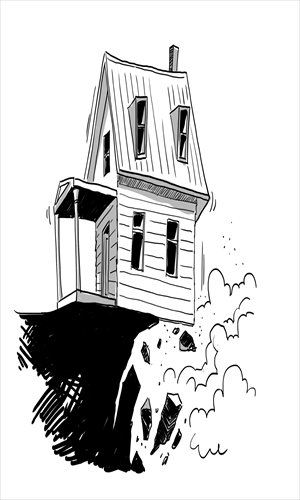Even Detroit looks good to nervous Chinese

The Chinese rush for real estate is bad enough at home, but seems even sillier abroad. This is highlighted by two stories exposed recently: one about Chinese buying up decrepit Detroit houses for a buck apiece, the other about a mother buying a $6.5 million apartment in Manhattan at the beginning of last year for her child, now a toddler, to use when she goes to university.
It's a strange time to invest in Detroit, a shrinking and crime-ridden city. One local Chinese newspaper in the US quoted a real-estate agent as saying "I bring my gun with me when I have to bring customers to visit the properties in downtown Detroit. If you want to go and look for properties, you need to buy a gun first."
Detroit is one of the most dangerous cities in the US with high unemployment and an increasing number of vacant properties. The city is bleeding, and hardly the place to throw money. Potential investors should do their homework and look before they leap.
The Manhattan story actually makes more sense as an investment. After all, the value of the property, purchased about two years ago, had already increased by $2.4 million.
But both tales represent the growing trend to invest overseas, either in order to secure a foothold for immigration or education, or just for profit. Many Chinese have invested in the US and some European countries, like Cyprus, with the hope of later emigration to those countries.
Chinese might be flocking abroad to snap up prized properties, but they need to have a better understanding of the waters they're swimming into.
Take Cyprus, where the focus on offshore banking has left the economy stranded by the tide of recession in Europe. Although the bulk of the money is Russian, investors, including Chinese, could be looking at a painful haircut of as much as 60 percent of their savings.
Detroit has been declining for decades. During the 2008 economic crisis, many auto plants were forced to shut down, throwing thousands of locals into unemployment. Many people have since left the city, with its population dwindling to only 700,000, less than half of that in 1970.
With people fleeing Detroit, is it really wise for Chinese to move in?
China, as a rich source of international investment, should take a look at its own market and work to make it more attractive to domestic investors.
The number of investment channels in the Chinese market is limited for high net-worth individuals.
A report by Merrill Lynch Global Wealth Management in September 2010 indicated that the wealth of those Chinese with more than $1 million investable assets skyrocketed by 40.4 percent. This wealth needs to find a place to park.
With interest rates low in banks and a volatile stock market over the past years, there have been many reports of seemingly absurd and unreasonable investment in products like mung beans, garlic and ginger.
Investment in the overheated real estate sector used to be the No.1 choice for many people. But that's changing with the government control of the property market getting stricter and stricter. The latest version of regulations, for example, in the city of Beijing, says that singles are allowed to purchase one apartment only and transactions of second-hand houses are prone to a profit tax as high as 20 percent.
The ever-deepening pollution in water and air, endless food safety scandals and dissatisfaction with the Chinese education system are other factors driving Chinese investors to shift their attention increasingly overseas.
Many of the rich no longer see the country as a place for themselves or the kids. And a lot of this is dirty money that people want to get out of the system as soon as they can.
With the new Chinese leadership now poised to deepen reforms to further unleash market forces, improve productivity and build a domestic consumption market, China may start to look more attractive for domestic investors. Let's wait and see.
The author is a commentator on current affairs with China Radio International. opinion@globaltimes.com.cn